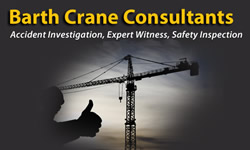As I see it, there needs to be some changes made in the crane industry. So much rides on updated federal regulations, featuring multi-lateral programs that are created and set in place by a network of people with little or no field experience (yet they are considered to be either "experts or professionals").
It seems to me that there are more accidents as a result of these programs that feature the licensees not requiring experience and therefore do not meet the necessary standards.
These 'experts and professionals' are the same ones that show up at accident scenes and then say that the problem was caused by the fact that the operators need better training. Obviously then, the training programs (using the new updated regulations as a guide) are faulty and must be updated.
Here is how I see it - the underlying premise is misleading. Some of these programs are basically a license for sale with the bottom line being that the people issuing these licenses make a profit, and this has caused a breakdown in the system.
We must not be complacent, the program itself may be weak, but we cannot forget that the consequences are major. Some of the operators that have recently been licensed using the new standards available have been responsible for, and even victims of, some fatal accidents. And yet, the responsibility does not seem to fall back to the people that tested and trained them. But maybe it should. There needs to be some accountability.
One step that should be considered (and soon) is for the 'experts and professionals' to have dialogue with field people. That would create a working relationship so there can be a consensus reached and specific benchmarks established for the licensing and certification of crane operators.
Most of the experts and professionals that have developed the recent programs have never been in a crane or on a job site. There is very strong emphasis on profit in some of the companies involved. We in the profession need to stop dancing around this issue and address the real need for crane operator training. This not only involves training and certification of new crane operators, but training the people with authority over these operators.
The issue is two pronged. The supervisor gives the orders, yet does not have any knowledge of operating a crane, and whose sole purpose is usually to see that the job gets completed as fast as possible and under budget. It's amazing. I know I have been harping on crane safety and training for a long time. The fact remains, though, that only an impressive surge of change in the area of crane industry licensing and certification will make it safer. While there is no one center to gather the statistics on crane accidents, OSHA's antiquated and incomplete reports are still important tools. OSHA reports that in the USA alone, crane accidents claim 50 lives every year, and more than 500 US construction workers died in crane accidents between 1984 and 1994. These numbers may not be completely accurate, but I believe they are close.
The International Union of Operating Engineers revealed that 502 works died in 480 separate accidents (from 1994 to 2006). The rate of crane accidents has jumped dramatically in the latter years. Could this possibly be related to the relaxing of the standards covering proper training? In the past, when operators applied for their license, the requirement was to complete a 4,000 hour program. Gradually, the number of hours was reduced to 1,000 and at the present time, the only requirement is to prepare for a test. A successful completion of a written practical test means that the very next day, the new operator could be on a job with a "blanket" license running a crane. The license is non-specific, it could be any crane.
A hydraulic crane is easier to operate than a lattice boom, but new operators are out there with no field experience whatsoever. The "rookie" is now helped along by other operators, most of whom arrived on the site the same way he did. Now, they teach the new operator all the bad habits they learned.
And it snowballs. We have operators attempting to accomplish a job, under the belief thay have the training to do so by studying and passing a test. Anyone that can read and study can pass a written test. And a little training the hands-on way is not necessarily bad. In fact, it's better than no experience at all. But should it be a qualifying factor to be considered competent to operate a crane?
I think we would all agree that we would never get in a plane if the requirement for a pilots license was simply to take a written test. Even a hairdresser needs 2000 hours of schooling and on-the-job experience with an instructor before being issued a license. Yet, in the critical industry of operating a crane, you need only to take a test? Now I ask you, which one should have more hours of training? Does this make sense?
In ASME B30.5-2004 Mobile and Locomotive Crane 5.3.1 2 #5 states certain requirements for satisfactory completion of an operation test demonstrating proficiency in handling the specific crane type, including both pre-start and post-start inspection, maneuvering skills, shut down and securing procedures.
This requirement has been omitted from a program that only uses a written test and then puts you right out on the job. The lack of this type of qualification seems to be a pre-cursor to accidents.
I have been a crane operator for many years, a crane inspector accredited by USD/OSHA under 29CFR and an expert witness in crane accidents. In the majority of cases I have been involved with, the bottom line seems to be the lack of proper training for the operator, including the operator not having the training or license for the specific crane that was involved in the accident. My concern is for the crane operators and the employees that work along side them. Actually, when you get down to the bottom line, my REAL concern is not just for the crane operators and support employees. My real concern is for the children that are unnecessarily left without a parent! These are the true victims. They are the ones that will suffer the most. How do we explain to them why their mother or father will never come home again?
Criticizing the methods of the limited training programs is not enough; theree is the more important issue of safety that needs to be addressed. Officials need to put an immediate hold on the present license requirements, re-tool the programs to focus on the proper training of crane operators, and further to include the training of flag personnel, supervisors and all employees that work around cranes.











